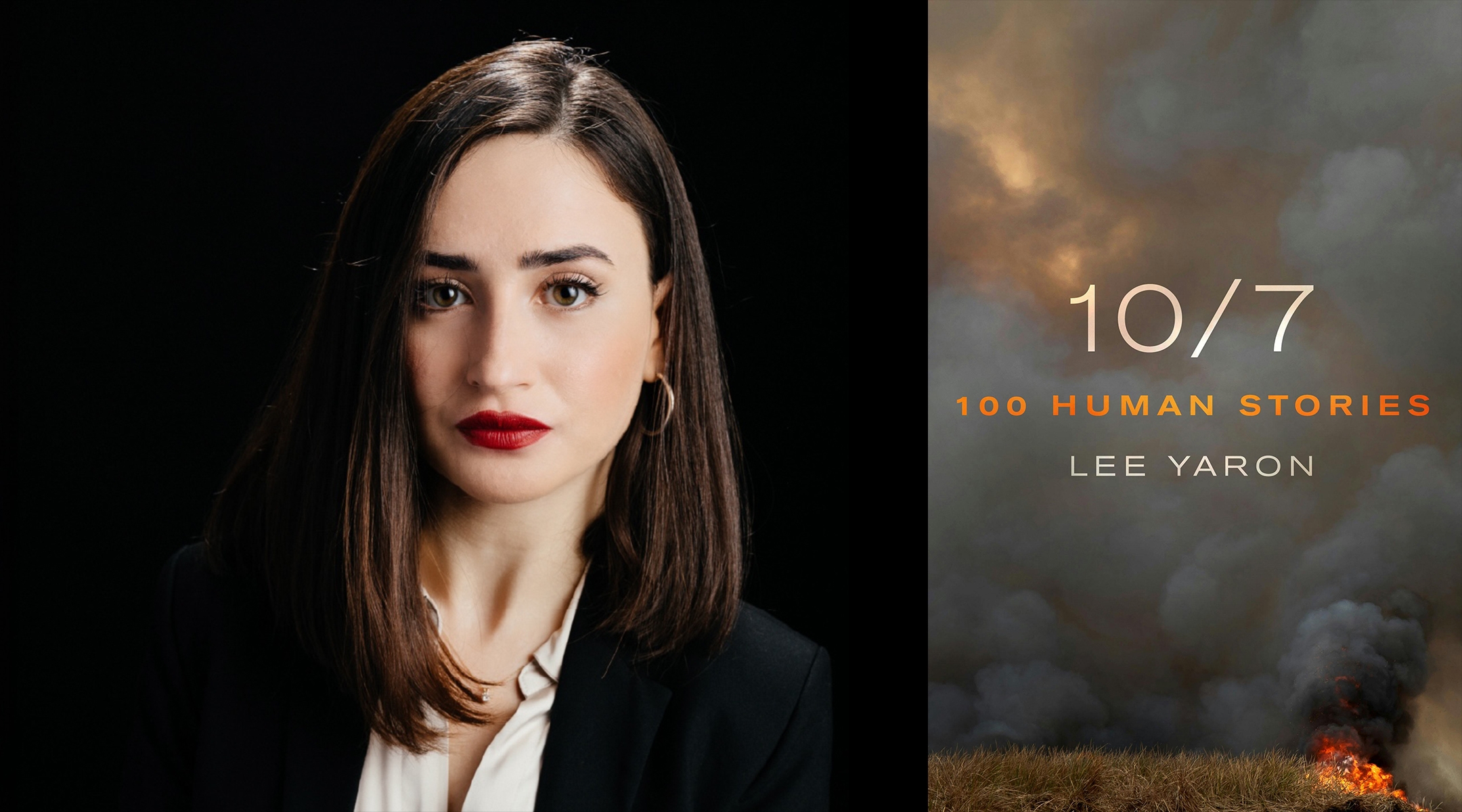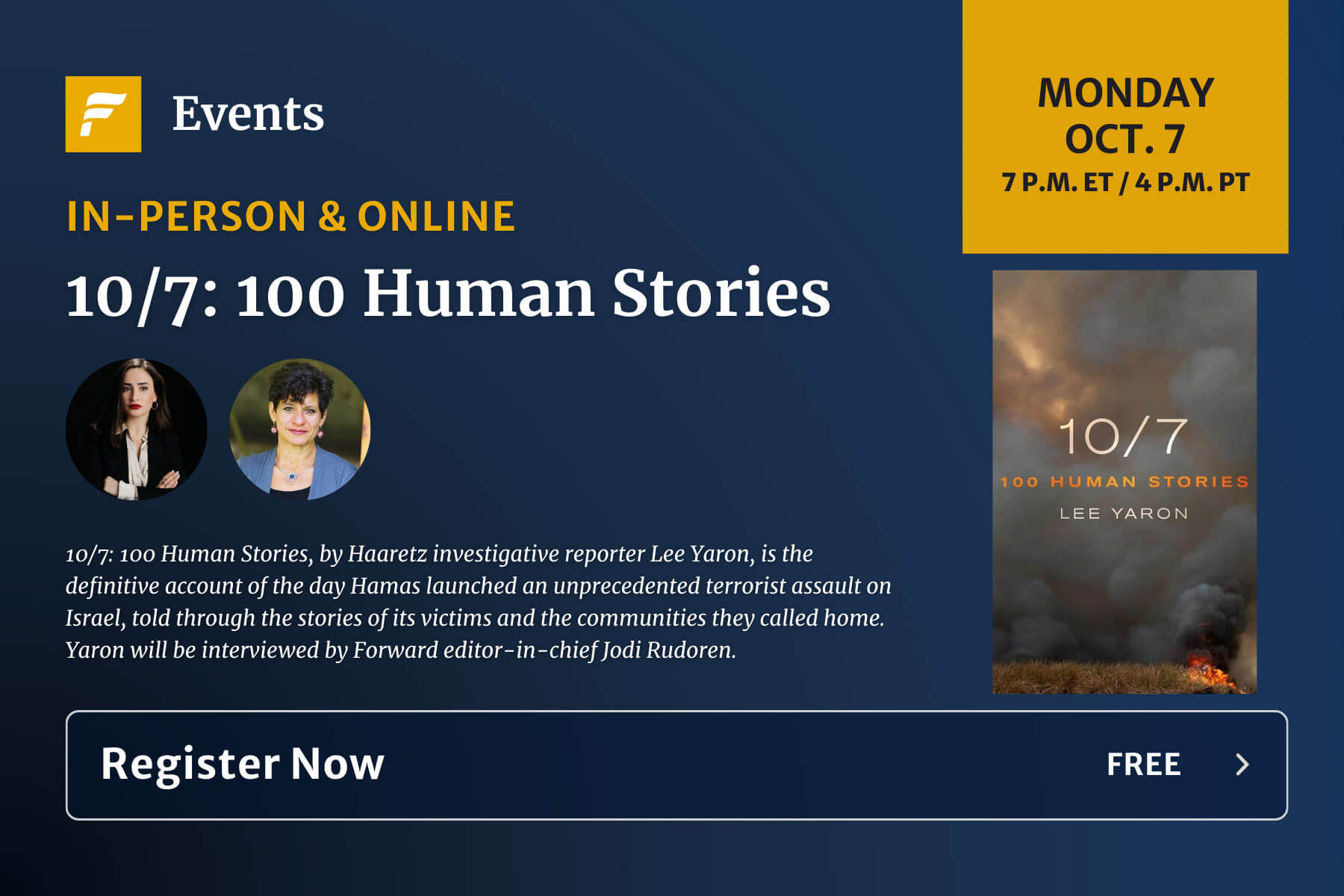A new book about Oct. 7 aims to depict the humanity behind the horror
Israeli journalist Lee Yaron spent months interviewing survivors and eyewitnesses

In “10/7,” journalist Lee Yaron profiles victims of the Oct. 7 massacre from a wide range of communities. (Uri Bareket; St. Martin’s Press)
(JTA) — Lee Yaron was in New York on Oct. 7, doing a fellowship at Columbia University, when news broke of an unimaginable attack on southern Israel by Hamas. Like many Israelis living abroad, she felt helpless and frustrated. Unlike most Israelis, she is a journalist, a longtime contributor to the Israeli daily Haaretz, and she had an outlet for her fear and anger.
Within days, she was on a plane to Israel, where she spent the next four months interviewing survivors, first-responders and eyewitnesses to the attacks. The result is “10/7: 100 Human Stories,” a book that documents perhaps the single most traumatic day in Israeli history through intimate profiles of some of the 1,200 people killed and hundreds of people taken hostage.
“I was still very much overwhelmed with my own grief and sense of shock and just this deep feeling that I need to do something,” Yaron, 30, said in an interview this week. “On the one hand, it was very traumatic, and I feel it now, even more than I felt it when I was writing the book. At the same time, I had a mission, I knew what I needed to do, and I was focused on this. The book helped me to deal with my grief and my sense of hopelessness.”
“10/7: 100 Human Stories” joins a number of works of nearly “instant” reporting and documentation of the attack on Israel, including the documentary film “Supernova-The Music Festival Massacre”; a forthcoming documentary on Paramount+, “We Will Dance Again”; a play, “October 7: In Their Own Words,” based on firsthand testimony; and a museum-style exhibit, “The Nova Exhibition,” that was staged in Israel, New York and now Los Angeles.
On Thursday, Yaron will be appearing on a virtual panel, sponsored by the Jewish Telegraphic Agency and the National Library of Israel, with Amir Tibon, the Haaretz journalist whose new book, “The Gates of Gaza,” describes how he was rescued from Kibbutz Nahal Oz on Oct. 7 by his own father.
“10/7” is, however, the most expansive account yet of the day, capturing the diversity of the victims and survivors and, by extension, of Israel as a whole. There are stories of Jewish refugees who fled the war in Ukraine, and Mizrahi Jews who escaped their countries to come to Israel in the 1950s. Hamas didn’t discriminate among left-wing kibbutzniks, blissed-out club kids or right-wing followers of Prime Minister Benjamin Netanyahu. Nor did they spare Bedouins, Thai and Nepalese migrant workers, or the Christian and Muslim Arabs who, she writes, “had the gall to live among Jews as fellow citizens.”
Often in her research, one story would lead to another, a chain of family, friends and neighbors who died at the hands of terrorists, or survived huddled in safe rooms or simply sheltering in places the attackers overlooked.
Yaron, who divides her time between New York and Israel, has been a journalist with Haaretz for nearly a decade, focusing on what she calls people on the margins of Israeli society: asylum seekers, the LGBT community, victims of sexual violence and the poor. In all these stories, she said, she tries to describe a situation from the “bottom up.”
“We’ve been flooded with information about Israel and Palestine, but we’re hearing from the politicians, from the Israeli government, from Hamas — from the people that created the conflict, not from the people affected by it,” she said.
In an afterword to “10/7,” Yaron’s husband, the Pulitzer Prize-winning novelist Joshua Cohen, compares the book to the Yizker-bikher, or memorial books, written by Holocaust survivors to document the history of Jewish communities destroyed by the Nazis — an effort, writes Cohen, “that seeks to reclaim the dead, at least some of them, from numeric anonymity and political exploitation.”
Yaron accepts the comparison, but with a caveat. Survivors created memorial books so “people wouldn’t deny these crimes and so the stories will be documented,” she said. “But here the main difference is that Hamas documented everything. They weren’t trying to deny it.”
She also intends the book as a corrective to those who seek to exploit the tragedy, whatever their politics. The book is dedicated to Gal Eisenkot, the son of Israeli government minister Gadi Eisenkot, who was killed in December in northern Gaza during an operation that led to the recovery of two hostages’ bodies.
“He was a very dear friend of mine since we were kids,” said Yaron, who was born in Tel Aviv. “One of the most difficult things after we got the message that Gal died was to see how his death was politicized and used by so many different politicians with different agendas, making him some kind of a symbol and eliding who he was as a person, his humanity, his personality, the unique things that made Gal Gal.
“I think that’s the difference between the reporting I’m doing and most of the coverage we’re reading, in that I am trying to keep people alive on paper, to keep the sense of humanity of who they were,” she continued.
She extends that sense of humanity to Israelis from across the religious and political spectrum, and finds disillusionment on all sides. She talks to Oct. 7 survivors who are appalled and furious and who in many cases became radicalized by what Hamas did and what they stand for, but who also feel betrayed by an army and government that did not protect them.
“When this fence was broken on Oct. 7, I think for a lot of Israelis, our sense of security was broken, too,” said Yaron. For her parents and grandparents — Romanian on her father’s side, Portuguese and Turkish on her mother’s — Israel meant safety. Yaron is now pained to see Israelis, perhaps 40,000 or more, who have left the country since Oct. 7 and have no immediate plans to return. “They’re all saying ‘we don’t trust Israel anymore to protect our kids. We don’t want to live with this anxiety of the army not being there to protect us, while we pay incredibly high taxes.’”
Does Yaron worry that books and films that focus on the horrors of Oct. 7 contribute to this sense of disillusionment, or perhaps harden readers and viewers to the suffering of Palestinians and the possibilities for peace?
“I write about the horrible situation in Gaza in the introduction to the book. It’s devastating that so many innocent people that had nothing to do with the crimes of Hamas paid the heaviest price: the deaths, the hunger, the disease. Most of Gaza is destroyed,” she said. “But primarily, I focus on the Israeli stories out of respect and recognition that the Palestinian stories, especially now, are not my stories to tell, and I do wait for my Palestinian colleagues to do this important work and tell the Palestinian stories.”
And Yaron hasn’t given up on her own hopes that Israel and its neighbors might one day live in peace. In the book she tells the story of Maoz Inon, originally from the Netiv HaAsara moshav on the border with Gaza, who runs a hospitality company that promotes Jewish-Arab coexistence. On Oct. 6, his parents Yakovi and Bilha returned to the moshav after a Friday-night dinner with their five children and 11 grandchildren in Tel Aviv. They died the next day after Hamas fired a rocket-propelled grenade into their house.
Maoz, who after the attack started a demonstration in front of the Knesset that turned into a protest camp, tells Yaron that his parents would have wanted him “to forgive, not to seek revenge.”
“It’s time for Israeli and Palestinians to understand each other’s narratives and pain, to unite in opposition to their politicians, and advocate for peace,” he says.
Yaron is aware that many Jewish authors have been ostracized by pro-Palestinian activists who see no distinction between hawkish nationalists or liberal Israelis who support coexistence with the Palestinians. As she begins promoting her book, she is wary of extremists on both sides, including Palestinian and Jews who seek a one-state solution that excludes one side or the other.
“The places where I met people chanting ‘from the river to the sea’ were in the West Bank by Jewish extremists and in Columbia University by the people from the global left,” she said.
“For me, justice is a compromise. As much as I would like to change some of the mistakes that early Zionism made, we can’t change the past. We can only think about the future and fight about the future. And I wish these [pro-Palestinian activists] would fight on the side of the Israeli left with the people that are trying to promote a solution and a peaceful life for all sides.”
As a liberal Zionist, Yaron said, “I’m alone inside of Israel, and I’m alone here. I really hope these people that I know that want justice, will learn to distinguish between people and their governments and understand that people are never to blame. I really hope this book will be also translated to Arabic, and I really hope it will be a first step of recognizing the humanity.”
JTA and the National Library of Israel present an online conversation with the authors of three new books about the events of Oct. 7 and the future of the Israeli-Palestinian conflict: Amir Tibon, Ilan Troen and Lee Yaron. Thursday, Sept. 12, 6 p.m. ET. Register here.

















